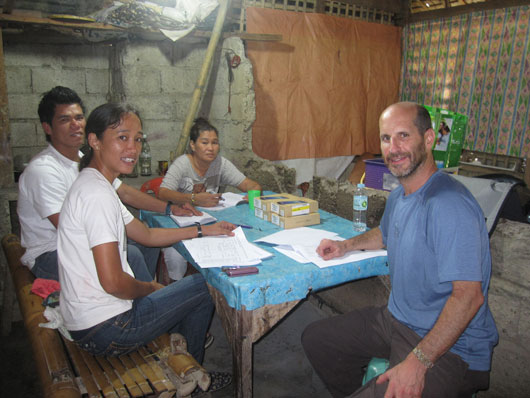Following the devastating typhoon in the Philippines in November, ET staff member, Gregg Butensky, initiated a fundraising effort to bring assistance to the people of Aklan on the island of Panay. Gregg has strong connections in Aklan having established a public lending library there over 15 years ago.
Earlier this month Gregg travelled to the region to ensure that the $10,000 raised is used in the most effective way possible. He’s providing the following dispatches for his donors, republished here for ET readers.

Having established a general plan of assistance – including boats, nets and housing – what remained to work out were all the details. I had also brought with me four Android tablets for use by the field teams here. I needed to hand those off and give an intro as to their use.
I had arranged for a rented motorbike through the TFT folks but when I mentioned this to Mrs G she sold me they had one I could use (complete with helmet!).
I rode into town to find the TFT office. They have a small dark concrete room off an alley. But with a lovely garden just outside, as their neighbors have a seedling business. The office roof was ripped off by the storm but has since been repaired.
Rowena, Nida, and Kim-Sin were there as well as several others. We went through the latest documents in detail. Most significantly:
– The fishing boats will be handled as a no-interest loan with a one year term.
– The Gomez family will be given special dispensation for rebuilding their house.
– Budget for project management will be covered for the first six months; funds will be generated to cover management costs after that initial period.
This took some time. Once we were done, we fired up the first tablet. The field teams do a lot of data collection with pen and paper – and then have to enter all the data into a (borrowed) computer once they return to Kalibo. I explained how they could use shared google docs in offline mode thus providing for one-time data entry as well as affording access to all previous data while in the field.
They may also be able to get online while in the field via a GPRS dongle for the tablet or via a data-enabled cellphone that provides a hotspot – but that would incur additional cost.
As can be expected, the young people in the room took to the new devices immediately. Within minutes they had one connected via bluetooth to a cell phone and were transferring music.
The following day there was an annual meeting of PAMALAKAYA, the organization of fisherfolk for the entire province. An activist labor organizer was in town from Manila. Elections would also be held for the organization’s leadership.
Nida picked me up in the morning and together we went to the meeting, held in a failed and abandoned hotel that had been partially repurposed as a community hall. Over lunch I spoke with the organizer from Manila and with George, another of TFT’s main participants. Both these guys were very knowledgable about issues confronting the poor fisherfolk throughout the country. Specifically, there are recent changes in laws that give large-scale, corporate fishing interests greater access to coastlines at the expense of small-time fisherfolk.
Much of the meeting was educational, with the organizer from Manila describing details of the new laws (and presumably talking about what the people could do to fight back). PAMALAKAYA will be our partner for the boat and net aspects of the project so I also said a few words to the gathered group.
Throughout all this, Kim-Sin exhibited perhaps the most common use of the new tablets. He used one to take photos and record video. While some individuals have cameras they are of poor quality and with short battery life.
While electricity has been restored following the storm everywhere I’ve been, power goes out regularly. In other words, things are back to normal in that regard!
Read Ethical Traveler's Reprint Policy.
